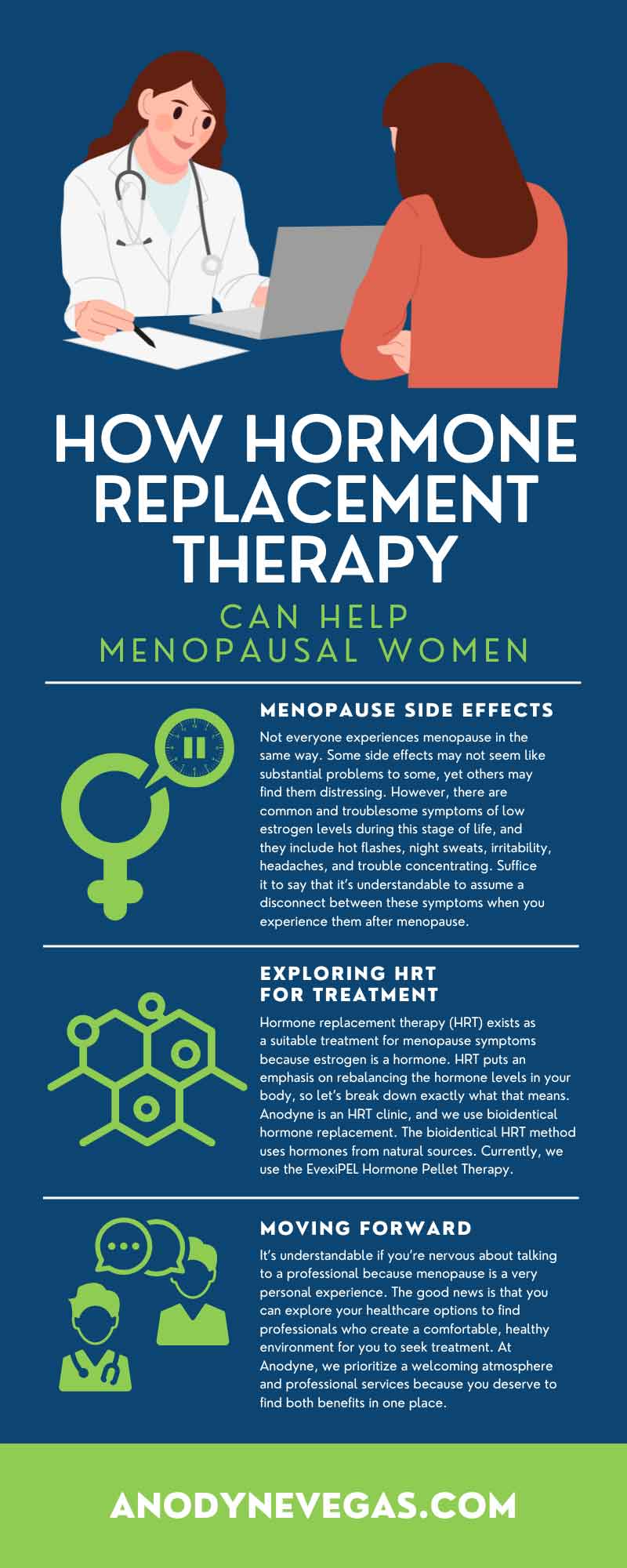Menopause is a well-known stage of a woman’s life that can have noticeable side effects. Luckily, you can find ways to handle this process with less discomfort and more peace of mind. Menopause is natural, but that doesn’t mean you have to stand by and deal with the side effects without any help. For instance, hormone replacement therapy (HRT) is one treatment option you can explore.
If this treatment is new to you, we can help you learn the essentials. Read this walkthrough of how hormone replacement therapy can help menopausal women to understand what HRT is and if it might be a satisfying treatment option for you.
Menopause Side Effects
Breaking down how HRT helps with menopause requires looking at how menopause can affect your body in the first place. Menopause is natural, and it’s important to remember that the presence of side effects does not mean something is wrong. The process of menopause results in a woman’s body changing, and that often results in lower estrogen levels.
Not everyone experiences menopause in the same way. Some side effects may not seem like substantial problems to some, yet others may find them distressing. However, there are common and troublesome symptoms of low estrogen levels during this stage of life, and they include hot flashes, night sweats, irritability, headaches, and trouble concentrating. Suffice it to say that it’s understandable to assume a disconnect between these symptoms when you experience them after menopause.
You may think that irritability may be coming from issues at work and that certainly may be a culprit, but it may not be the only one. If you’re experiencing these symptoms or more, don’t hesitate to talk to a professional for assistance.
Identifying Night Sweats
Before proceeding, let’s take a closer look at identifying certain menopause symptoms. Headaches, trouble concentrating, and irritability are all straightforward side effects. That said, what is the difference between night sweats and hot flashes? Let’s start with night sweats, which may seem self-explanatory at first glance. However, this is more than just sweating at night. Sometimes a bedroom gets too hot while you sleep, or you have too many covers on, and sweating occurs. Sweating in these instances is normal because your body is adjusting to the temperature increase in the room.
Night sweats occur due to your body causing excessive sweating in the middle of the night. When we say excessive sweating, we mean your clothes and bed sheets are soaking wet. Simply put, you will know something is wrong if you have night sweat symptoms. So, although you should always talk to a healthcare professional when you feel compelled to, remember that sweating in the middle of the night isn’t always a cause for alarm.
Situations like these are why treatments for menopause side effects are helpful, despite menopause itself being a very natural and normal process for the body. Menopause is part of the aging process, but you can reduce those side effects with the right treatment.
What Are Hot Flashes?
Another menopause side effect you may know by name but not by firsthand experience is hot flashes. Not everyone’s hot flashes will be equally severe, but the general experience is a wave of heat over the skin followed by uncomfortable sweating.
Hot flashes are very similar to night sweats, except your flashes will occur during the day instead of during your sleep. This time difference means that symptoms will occur at home, work, or wherever else you may be during the day. As a result, hot flashes can be quite disruptive to someone’s daily life. Thus, it’s always crucial to remember that you don’t have to deal with symptoms like hot flashes.
These symptoms may sound unpleasant, but you can seek help from professionals today. This experience isn’t something you have to go through on your own. Speaking of which, let’s take a closer look at how hormone replacement therapy can help menopausal women.
Exploring HRT for Treatment
Hormone replacement therapy (HRT) exists as a suitable treatment for menopause symptoms because estrogen is a hormone. HRT puts an emphasis on rebalancing the hormone levels in your body, so let’s break down exactly what that means. Anodyne is an HRT clinic, and we use bioidentical hormone replacement. The bioidentical HRT method uses hormones from natural sources. Currently, we use the EvexiPEL Hormone Pellet Therapy.
Bioidentical HRT
HRT may sound like a treatment using synthetic materials, but it doesn’t always work like that. You can speak to professionals about synthetic HRT, so the choice ultimately comes down to what you’re comfortable pursuing. Our team specializes in natural treatment solutions, and bioidentical hormone replacement therapy pairs perfectly with functional medicine practices to give patients pain relief. Of course, the right treatment always comes down to what’s right for the individual. That said, HRT treatment from a clinic that specializes in integrative medicine is an effective way to begin seeking solutions to your symptoms.
Bioidentical hormone replacement therapy uses materials from natural sources to create a hormone that matches what’s inside your body. We want to help you find a more harmonious solution for your body, and improving hormones with natural sources is a productive way to do it. Introducing new hormones into the body will help you get back into balance instead of having to settle with low estrogen and the symptoms that follow.
Moving Forward
It’s understandable if you’re nervous about talking to a professional because menopause is a very personal experience. The good news is that you can explore your healthcare options to find professionals who create a comfortable, healthy environment for you to seek treatment. At Anodyne, we prioritize a welcoming atmosphere and professional services because you deserve to find both benefits in one place.
Our specialists use bioidentical hormone replacement therapy to handle symptoms such as night sweats, hot flashes, and many more side effects of menopause. It’s important to understand how HRT can assist during menopause because this treatment is helpful for many, no matter what gender you are. This information is helpful to relay to others you know who may experience menopause at some point.
In addition, menopause is not the only reason for hormone imbalances, so understanding HRT is useful for a wide range of symptoms. Now that you have the guide above consider scheduling an appointment with your doctor to discuss integrating this treatment into your health plan. Together, you can handle menopausal symptoms with more clarity and peace of mind.

